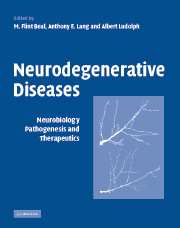Book contents
- Frontmatter
- Contents
- List of contributors
- Preface
- Part I Basic aspects of neurodegeneration
- Part II Neuroimaging in neurodegeneration
- Part III Therapeutic approaches in neurodegeneration
- Normal aging
- Part IV Alzheimer's disease
- Part VI Other Dementias
- Part VII Parkinson's and related movement disorders
- Part VIII Cerebellar degenerations
- Part IX Motor neuron diseases
- Part X Other neurodegenerative diseases
- Index
Preface
Published online by Cambridge University Press: 04 August 2010
- Frontmatter
- Contents
- List of contributors
- Preface
- Part I Basic aspects of neurodegeneration
- Part II Neuroimaging in neurodegeneration
- Part III Therapeutic approaches in neurodegeneration
- Normal aging
- Part IV Alzheimer's disease
- Part VI Other Dementias
- Part VII Parkinson's and related movement disorders
- Part VIII Cerebellar degenerations
- Part IX Motor neuron diseases
- Part X Other neurodegenerative diseases
- Index
Summary
Neurodegenerative diseases are becoming increasingly prevalent with the aging of the general population. The twentieth century witnessed a significant demographic change in the human population of the industrialized world that is currently followed by a similar shift of life expectancy to upper age ranges in Asia, Africa, and Middle and South America. Quality of life of the aging population of the world is, to a great extent, determined by the normal aging process of neurons in the central nervous system and especially by the occurrence of diseases characterized by accelerated neuronal loss: diseases which are traditionally designated as being neurodegenerative. They are presently amongst the major contributors to disability and disease in human populations.
Alzheimer's disease is the most prevalent of the neurodegenerative diseases followed by Parkinson's disease. Amyotrophic lateral sclerosis and Huntington's disease affect smaller numbers of patients but have devastating consequences. A large number of other rarer neurodegenerative diseases have similar profound effects on the patients and families who are afflicted by these illnesses. Research into the pathogenesis and treatment for these disorders is exploding exponentially. To a great extent this has been fostered by major advances in genetics, since we now know mutations that are associated with a large number of these illnesses. This includes familial forms of Alzheimer's disease, Parkinson's disease, fronto-temporal dementia, ALS, Huntington's disease and a variety of ataxias.
- Type
- Chapter
- Information
- Neurodegenerative DiseasesNeurobiology, Pathogenesis and Therapeutics, pp. xxi - xxiiPublisher: Cambridge University PressPrint publication year: 2005

